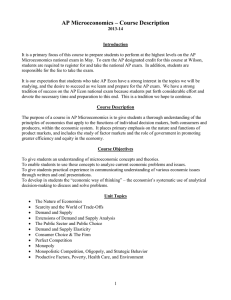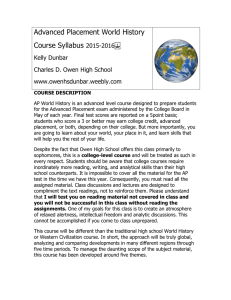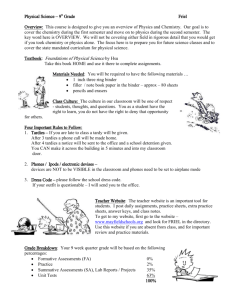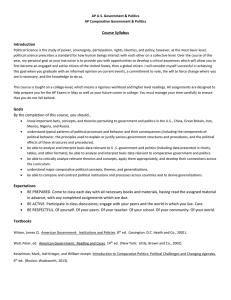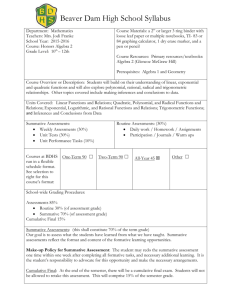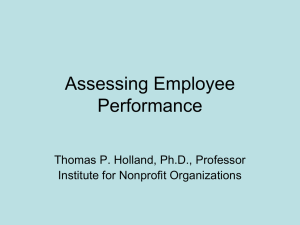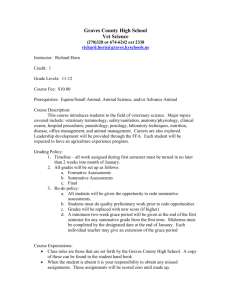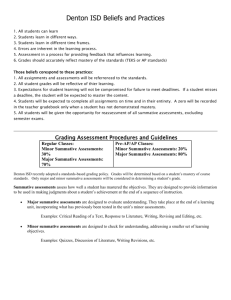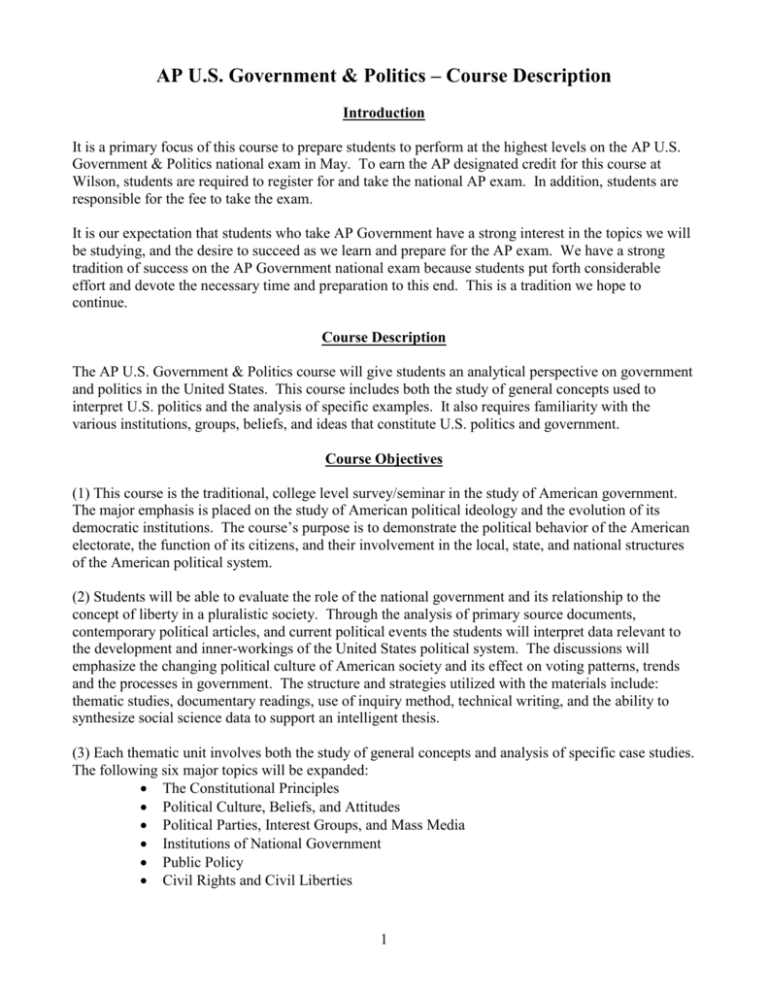
AP U.S. Government & Politics – Course Description
Introduction
It is a primary focus of this course to prepare students to perform at the highest levels on the AP U.S.
Government & Politics national exam in May. To earn the AP designated credit for this course at
Wilson, students are required to register for and take the national AP exam. In addition, students are
responsible for the fee to take the exam.
It is our expectation that students who take AP Government have a strong interest in the topics we will
be studying, and the desire to succeed as we learn and prepare for the AP exam. We have a strong
tradition of success on the AP Government national exam because students put forth considerable
effort and devote the necessary time and preparation to this end. This is a tradition we hope to
continue.
Course Description
The AP U.S. Government & Politics course will give students an analytical perspective on government
and politics in the United States. This course includes both the study of general concepts used to
interpret U.S. politics and the analysis of specific examples. It also requires familiarity with the
various institutions, groups, beliefs, and ideas that constitute U.S. politics and government.
Course Objectives
(1) This course is the traditional, college level survey/seminar in the study of American government.
The major emphasis is placed on the study of American political ideology and the evolution of its
democratic institutions. The course’s purpose is to demonstrate the political behavior of the American
electorate, the function of its citizens, and their involvement in the local, state, and national structures
of the American political system.
(2) Students will be able to evaluate the role of the national government and its relationship to the
concept of liberty in a pluralistic society. Through the analysis of primary source documents,
contemporary political articles, and current political events the students will interpret data relevant to
the development and inner-workings of the United States political system. The discussions will
emphasize the changing political culture of American society and its effect on voting patterns, trends
and the processes in government. The structure and strategies utilized with the materials include:
thematic studies, documentary readings, use of inquiry method, technical writing, and the ability to
synthesize social science data to support an intelligent thesis.
(3) Each thematic unit involves both the study of general concepts and analysis of specific case studies.
The following six major topics will be expanded:
The Constitutional Principles
Political Culture, Beliefs, and Attitudes
Political Parties, Interest Groups, and Mass Media
Institutions of National Government
Public Policy
Civil Rights and Civil Liberties
1
(4) The student will develop a more sophisticated understanding of majority-rule democracy,
constitutionalism and civil liberties. One will also be able to perceive relationships and distinctions in
and among the institutions and public policies of those who govern.
Course Text
Magleby, D., Orien, D., Light, P., Burns, J., Peltason, J., & Cronin, T. (2006). Government by the
People: National, State, and Local Version (21st ed.). Upper Saddle River, NJ: Pearson Prentice
Hall.
In addition, other primary source documents will be used.
Guidelines for the Course
Students are responsible for note taking, readings, and completion of all assigned work.
Reading assignments will be given in advance according to the attached calendar. The readings
include textbook as well as appropriate primary documents and articles.
Free Response Questions will be used as practice assessments to get students ready for the style
of questions they will see on the AP exam.
Students are required to contribute to class discussion in a seminar setting established in the
classroom.
Assessments & Grading
Summative assessments are the “end of the learning process” assessments that are used to
evaluate student mastery. This category of assessment (which includes mainly unit exams) is
90% of the students’ grade.
Retake Policy: Only summative assessments may be retaken (and in accordance to WHS
policy). A list of required items will need to be produced in order to retake a unit exam (notes,
HW, classwork and any other activities from the unit).
Formative assessments are the “along the way” assessments that are used to gauge progress and
make improvement before the summative (some classwork, journal cards, quizzes, etc.)
assessments take place. This category of assessment is 10% of the students’ grade.
ALL UNIT TESTING FOLLOWS ADVANCED PLACEMENTS PRINCIPLES & FORMAT
Unit Exams are given at the conclusion of a section of the course. This examination will
consist of objective questions and free response questions. There are routinely 2 unit exams per
marking period.
Journal Cards – 5x8-index cards used to summarize/analyze supplemental readings for HW or
in class. Front side – title of the article, author, thesis, outline of the main argument and
summary of key concepts. Back Side – student’s reaction, response, and questions from the
reading. This format should be followed for every Journal Card assignment.
Quizzes, projects and debates – are used often to provide unique learning opportunities and a
chance to assess student understanding. Depending on the nature of the assessment, they may
be summative or formative.
ID Cards – 3x5 cards used to identify key terms, significant court cases, pieces of legislation,
important concepts. Excellent review tool for unit exams, midterms, finals and the AP exam at
the end.
HW assignments are given and checked to develop understanding of key concepts. This
category is given 0% weight toward the quarter grade.
2

